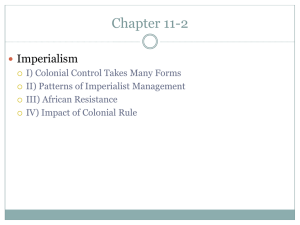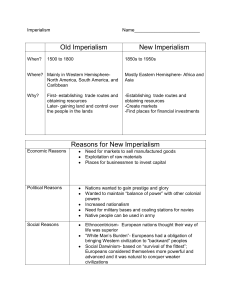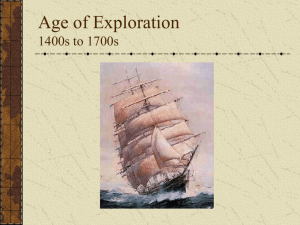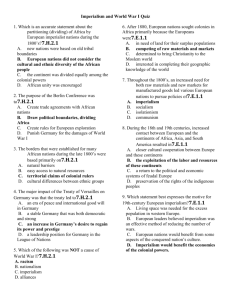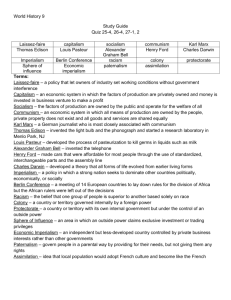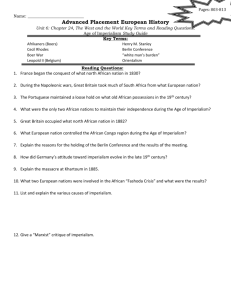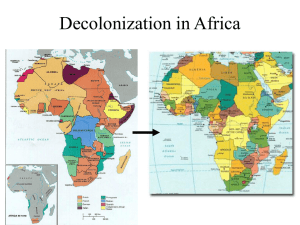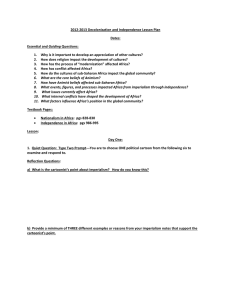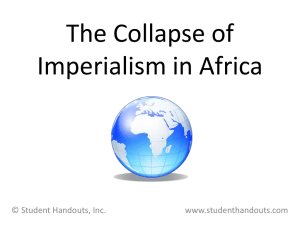10.10.1 - Imperialism in Africa Lesson
advertisement
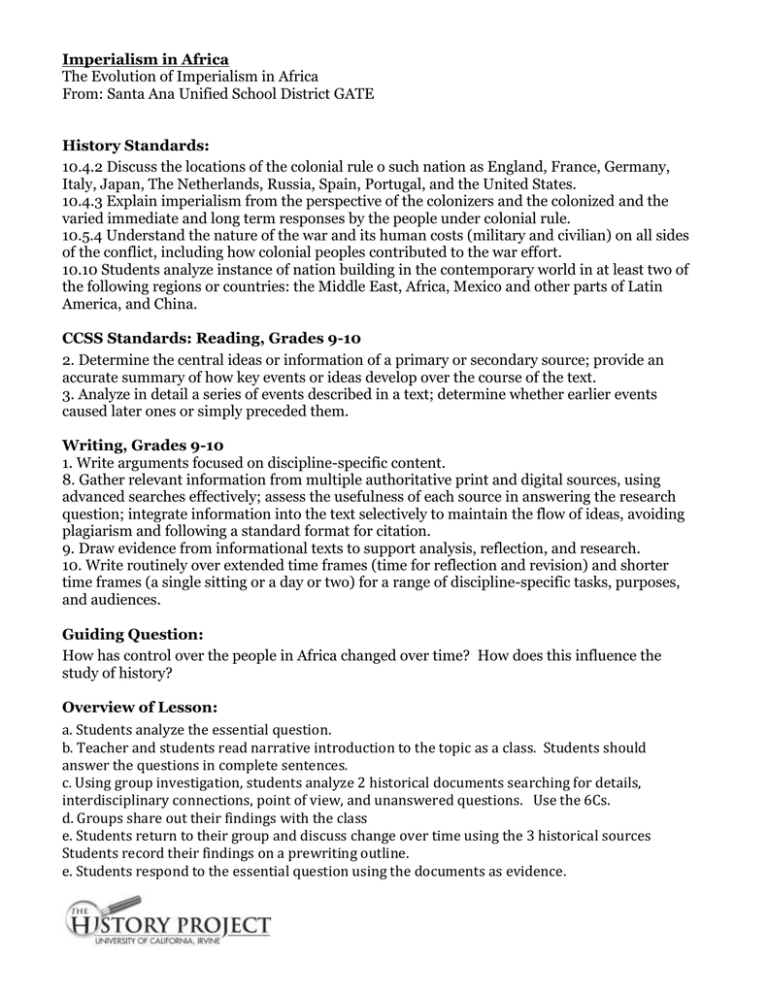
Imperialism in Africa The Evolution of Imperialism in Africa From: Santa Ana Unified School District GATE History Standards: 10.4.2 Discuss the locations of the colonial rule o such nation as England, France, Germany, Italy, Japan, The Netherlands, Russia, Spain, Portugal, and the United States. 10.4.3 Explain imperialism from the perspective of the colonizers and the colonized and the varied immediate and long term responses by the people under colonial rule. 10.5.4 Understand the nature of the war and its human costs (military and civilian) on all sides of the conflict, including how colonial peoples contributed to the war effort. 10.10 Students analyze instance of nation building in the contemporary world in at least two of the following regions or countries: the Middle East, Africa, Mexico and other parts of Latin America, and China. CCSS Standards: Reading, Grades 9-10 2. Determine the central ideas or information of a primary or secondary source; provide an accurate summary of how key events or ideas develop over the course of the text. 3. Analyze in detail a series of events described in a text; determine whether earlier events caused later ones or simply preceded them. Writing, Grades 9-10 1. Write arguments focused on discipline-specific content. 8. Gather relevant information from multiple authoritative print and digital sources, using advanced searches effectively; assess the usefulness of each source in answering the research question; integrate information into the text selectively to maintain the flow of ideas, avoiding plagiarism and following a standard format for citation. 9. Draw evidence from informational texts to support analysis, reflection, and research. 10. Write routinely over extended time frames (time for reflection and revision) and shorter time frames (a single sitting or a day or two) for a range of discipline-specific tasks, purposes, and audiences. Guiding Question: How has control over the people in Africa changed over time? How does this influence the study of history? Overview of Lesson: a. Students analyze the essential question. b. Teacher and students read narrative introduction to the topic as a class. Students should answer the questions in complete sentences. c. Using group investigation, students analyze 2 historical documents searching for details, interdisciplinary connections, point of view, and unanswered questions. Use the 6Cs. d. Groups share out their findings with the class e. Students return to their group and discuss change over time using the 3 historical sources Students record their findings on a prewriting outline. e. Students respond to the essential question using the documents as evidence. Imperialism in Africa: How has control over the people in Africa changed over time? How does this influence the study of history? After the Industrial Revolution, the period of New Imperialism began. European nations desired to control other countries to obtain natural resources, find new markets to sell their goods and to bring glory to their empire. From 1875-1900 Europeans scrambled to colonize Africa resulting in nearly the entire continent to be taken over and ruled by foreigners. This control of the region brought great wealth to European nations. In the beginning, explorers discovered the great potential of colonizing Africa and soon countries and investors began to flock there in order to obtain wealth. Europeans governments began by granting private companies large areas of land to undertake economic activities such as mining, plantations, agriculture, or railroad construction. These companies had permission to tax the people and recruit labor. This approach allowed European governments to colonize and exploit large territories with only a small investment in capital and personnel. These companies used brutal forced labor, which provoked a public outcry in Europe, and profits smaller than anticipated convinced most European th governments by the early 20 century to stop the powers of private companies and to establish their own rules. Most countries relied on direct rule. They goal was to remove strong kings and other leaders and to replace them with Europeans or people who followed European control. The lack of European personnel, long distances and ineffective communication (inability to speak local languages and a limited understanding of local customs among European official) further undermined their effective administration. During WWI (1914-1918) African colonies were bound to European powers and became participants in the war, willing or not. This forced recruitment of military service led some Africans to fight against their colonial country. However, Europeans generally put down the uprising. After WWI and the treaty of Versailles, Germany lost control over their colonies to other countries. These countries continued their economic exploitation of Africa. Many Africans were disappointed that their contributions to the war went unrewarded. After WWI, Woodrow Wilson’s ideas of self-determination influenced the growth of African’s new elite who would promote nationalism. These African intellectuals searched for new identities and looked to find a way to remove European control. After WWII, decolonization began, but the Cold War and internal divisions between African societies slowed the process. Increased nationalism caused many regions in Africa to rise up and overthrow their colonial power. In Sub-Saharan, Ghana found success in achieving its freedom from British rule in 1957. Ghana inspired other African nationalist movements. After independence, Ghana prepared for a visit from Britain’s Queen Elizabeth. The people created roadside portraits to show their newfound equality. In other places the resistance was not as peaceful. Violence and discontent was used during rebellion from Colonial powers. Another challenge to decolonization was that Europeans created boundaries that did not correspond to economic or ethnic divisions. As a result, achieving national unity was difficult because there were numerous conflicts between ethnic groups within the states. Political institutions struggled because of great poverty. Increased tensions made the absence of good administration and welfare programs more difficult. Poverty also prevented nations from gaining the capital that could have contributed to a sound political and economic infrastructure. Several African nations fell prey to harsh military rule. South Africa managed in part to solve its political crisis and discord, providing a model for multiethnic African transformation even as ethnic violence flared. However, as elsewhere large numbers of white settlers in South Africa sought for the arrival of black freedom. Under the National Party the government instituted a harsh new set of laws designed to control the black population, these new laws constituted the system known as apartheid or “separateness.” This system asserted white supremacy and institutionalized the racial segregation in 1948, but in 1989 the President of South Africa and Nelson Mandela began to remove the apartheid system. Most African nations are less developed countries- countries that have the lowest per capital incomes and little industrial development. Yet, it is rich in mineral resources, raw materials, and agricultural products, but it lacks the capital, technology, foreign markets, and managerial class necessary to exploit its natural wealth. Africa’s burdens were complicated by droughts, famines, and agricultural production that could not keep pace with population growth. Nevertheless, African sates have continued to enter into the global economy.
